Professional Issues and Leadership Challenges for Graduate Nurses
VerifiedAdded on 2023/06/03
|10
|2190
|492
Essay
AI Summary
This essay explores the professional issues and leadership challenges faced by graduate registered nurses (GRNs), emphasizing the significance of mentoring as a professional development strategy during their transition to practice. It critically discusses the importance of work-life balance and resilience in managing the demanding nature of nursing, highlighting how mentoring can aid in developing self-leadership skills and effective time management. The essay also advocates for realistic actions and goals, such as reducing workplace stress and promoting self-management, to help GRNs achieve a healthier work-life integration. Ultimately, the paper concludes that addressing these challenges through mentorship and proactive strategies is crucial for the professional growth and well-being of graduate registered nurses. Desklib offers similar solved assignments and resources for students.
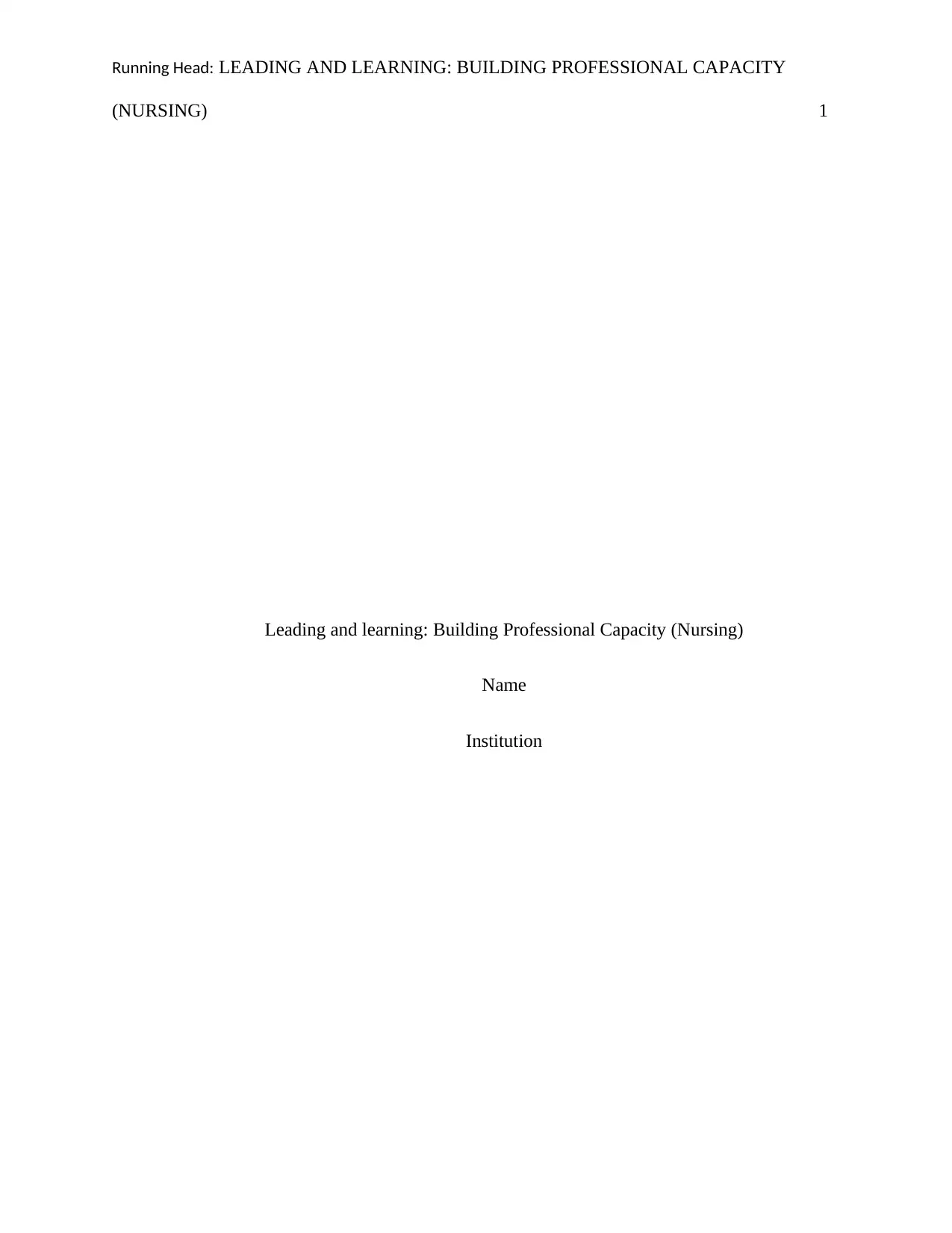
Running Head: LEADING AND LEARNING: BUILDING PROFESSIONAL CAPACITY
(NURSING) 1
Leading and learning: Building Professional Capacity (Nursing)
Name
Institution
(NURSING) 1
Leading and learning: Building Professional Capacity (Nursing)
Name
Institution
Paraphrase This Document
Need a fresh take? Get an instant paraphrase of this document with our AI Paraphraser
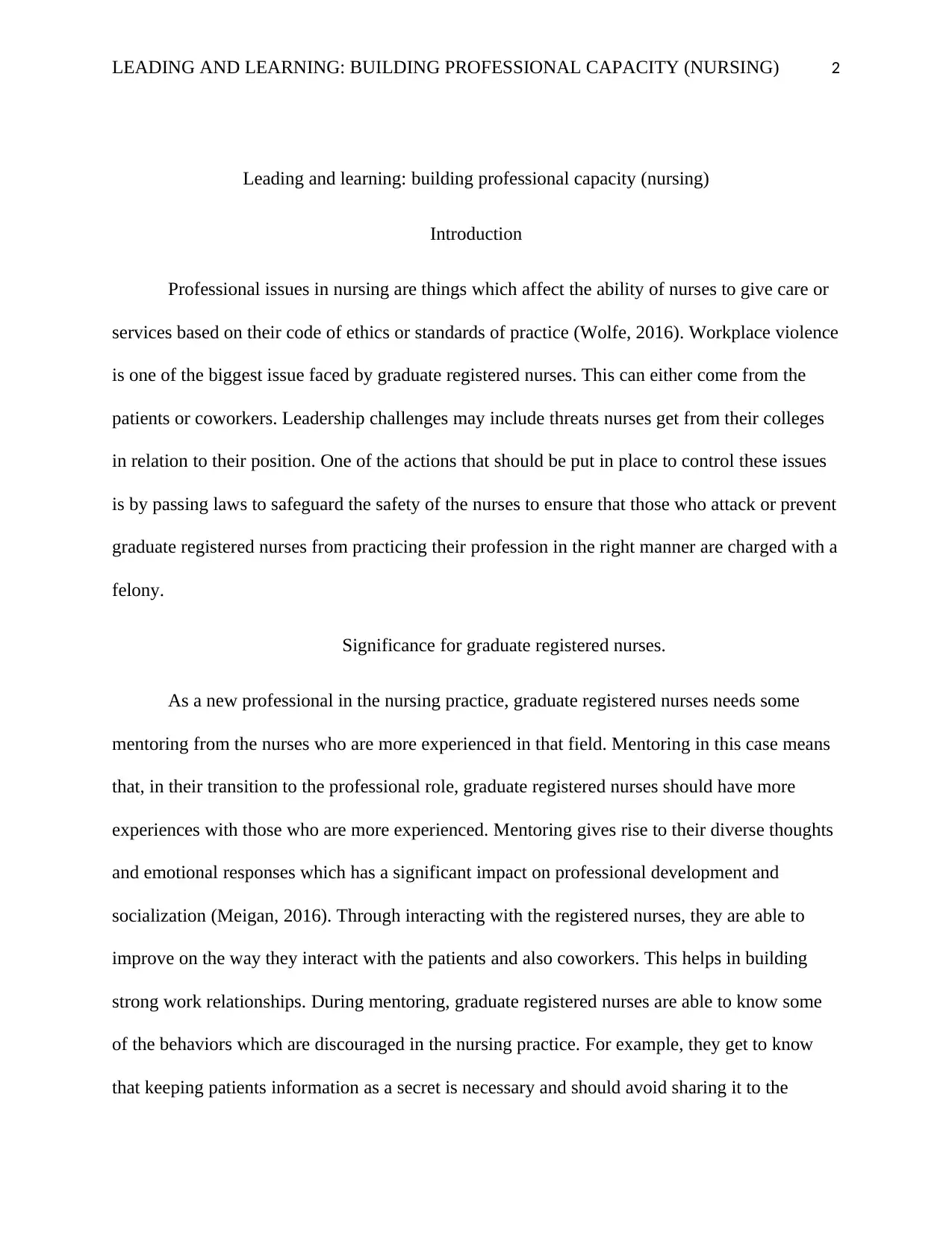
LEADING AND LEARNING: BUILDING PROFESSIONAL CAPACITY (NURSING) 2
Leading and learning: building professional capacity (nursing)
Introduction
Professional issues in nursing are things which affect the ability of nurses to give care or
services based on their code of ethics or standards of practice (Wolfe, 2016). Workplace violence
is one of the biggest issue faced by graduate registered nurses. This can either come from the
patients or coworkers. Leadership challenges may include threats nurses get from their colleges
in relation to their position. One of the actions that should be put in place to control these issues
is by passing laws to safeguard the safety of the nurses to ensure that those who attack or prevent
graduate registered nurses from practicing their profession in the right manner are charged with a
felony.
Significance for graduate registered nurses.
As a new professional in the nursing practice, graduate registered nurses needs some
mentoring from the nurses who are more experienced in that field. Mentoring in this case means
that, in their transition to the professional role, graduate registered nurses should have more
experiences with those who are more experienced. Mentoring gives rise to their diverse thoughts
and emotional responses which has a significant impact on professional development and
socialization (Meigan, 2016). Through interacting with the registered nurses, they are able to
improve on the way they interact with the patients and also coworkers. This helps in building
strong work relationships. During mentoring, graduate registered nurses are able to know some
of the behaviors which are discouraged in the nursing practice. For example, they get to know
that keeping patients information as a secret is necessary and should avoid sharing it to the
Leading and learning: building professional capacity (nursing)
Introduction
Professional issues in nursing are things which affect the ability of nurses to give care or
services based on their code of ethics or standards of practice (Wolfe, 2016). Workplace violence
is one of the biggest issue faced by graduate registered nurses. This can either come from the
patients or coworkers. Leadership challenges may include threats nurses get from their colleges
in relation to their position. One of the actions that should be put in place to control these issues
is by passing laws to safeguard the safety of the nurses to ensure that those who attack or prevent
graduate registered nurses from practicing their profession in the right manner are charged with a
felony.
Significance for graduate registered nurses.
As a new professional in the nursing practice, graduate registered nurses needs some
mentoring from the nurses who are more experienced in that field. Mentoring in this case means
that, in their transition to the professional role, graduate registered nurses should have more
experiences with those who are more experienced. Mentoring gives rise to their diverse thoughts
and emotional responses which has a significant impact on professional development and
socialization (Meigan, 2016). Through interacting with the registered nurses, they are able to
improve on the way they interact with the patients and also coworkers. This helps in building
strong work relationships. During mentoring, graduate registered nurses are able to know some
of the behaviors which are discouraged in the nursing practice. For example, they get to know
that keeping patients information as a secret is necessary and should avoid sharing it to the
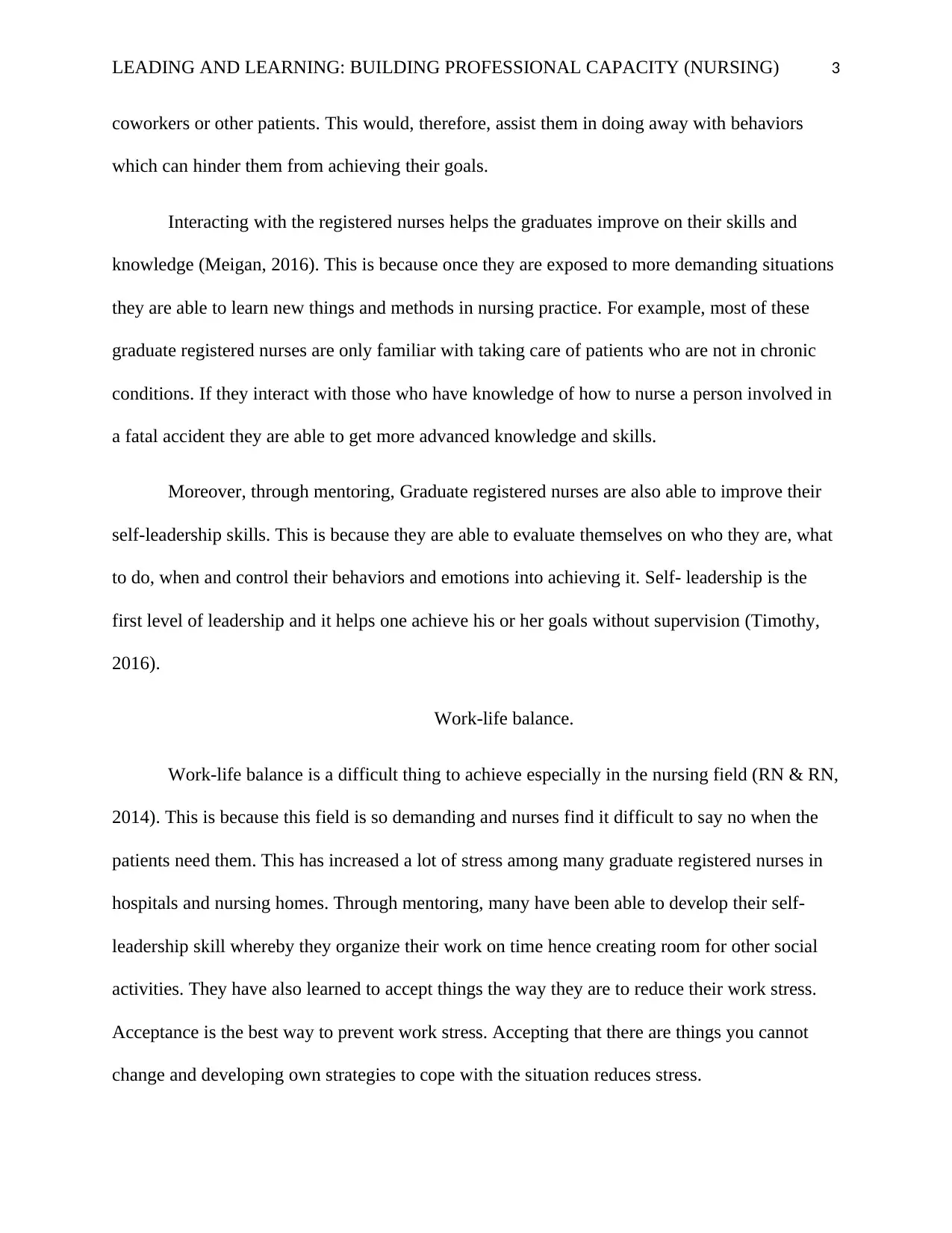
LEADING AND LEARNING: BUILDING PROFESSIONAL CAPACITY (NURSING) 3
coworkers or other patients. This would, therefore, assist them in doing away with behaviors
which can hinder them from achieving their goals.
Interacting with the registered nurses helps the graduates improve on their skills and
knowledge (Meigan, 2016). This is because once they are exposed to more demanding situations
they are able to learn new things and methods in nursing practice. For example, most of these
graduate registered nurses are only familiar with taking care of patients who are not in chronic
conditions. If they interact with those who have knowledge of how to nurse a person involved in
a fatal accident they are able to get more advanced knowledge and skills.
Moreover, through mentoring, Graduate registered nurses are also able to improve their
self-leadership skills. This is because they are able to evaluate themselves on who they are, what
to do, when and control their behaviors and emotions into achieving it. Self- leadership is the
first level of leadership and it helps one achieve his or her goals without supervision (Timothy,
2016).
Work-life balance.
Work-life balance is a difficult thing to achieve especially in the nursing field (RN & RN,
2014). This is because this field is so demanding and nurses find it difficult to say no when the
patients need them. This has increased a lot of stress among many graduate registered nurses in
hospitals and nursing homes. Through mentoring, many have been able to develop their self-
leadership skill whereby they organize their work on time hence creating room for other social
activities. They have also learned to accept things the way they are to reduce their work stress.
Acceptance is the best way to prevent work stress. Accepting that there are things you cannot
change and developing own strategies to cope with the situation reduces stress.
coworkers or other patients. This would, therefore, assist them in doing away with behaviors
which can hinder them from achieving their goals.
Interacting with the registered nurses helps the graduates improve on their skills and
knowledge (Meigan, 2016). This is because once they are exposed to more demanding situations
they are able to learn new things and methods in nursing practice. For example, most of these
graduate registered nurses are only familiar with taking care of patients who are not in chronic
conditions. If they interact with those who have knowledge of how to nurse a person involved in
a fatal accident they are able to get more advanced knowledge and skills.
Moreover, through mentoring, Graduate registered nurses are also able to improve their
self-leadership skills. This is because they are able to evaluate themselves on who they are, what
to do, when and control their behaviors and emotions into achieving it. Self- leadership is the
first level of leadership and it helps one achieve his or her goals without supervision (Timothy,
2016).
Work-life balance.
Work-life balance is a difficult thing to achieve especially in the nursing field (RN & RN,
2014). This is because this field is so demanding and nurses find it difficult to say no when the
patients need them. This has increased a lot of stress among many graduate registered nurses in
hospitals and nursing homes. Through mentoring, many have been able to develop their self-
leadership skill whereby they organize their work on time hence creating room for other social
activities. They have also learned to accept things the way they are to reduce their work stress.
Acceptance is the best way to prevent work stress. Accepting that there are things you cannot
change and developing own strategies to cope with the situation reduces stress.
⊘ This is a preview!⊘
Do you want full access?
Subscribe today to unlock all pages.

Trusted by 1+ million students worldwide
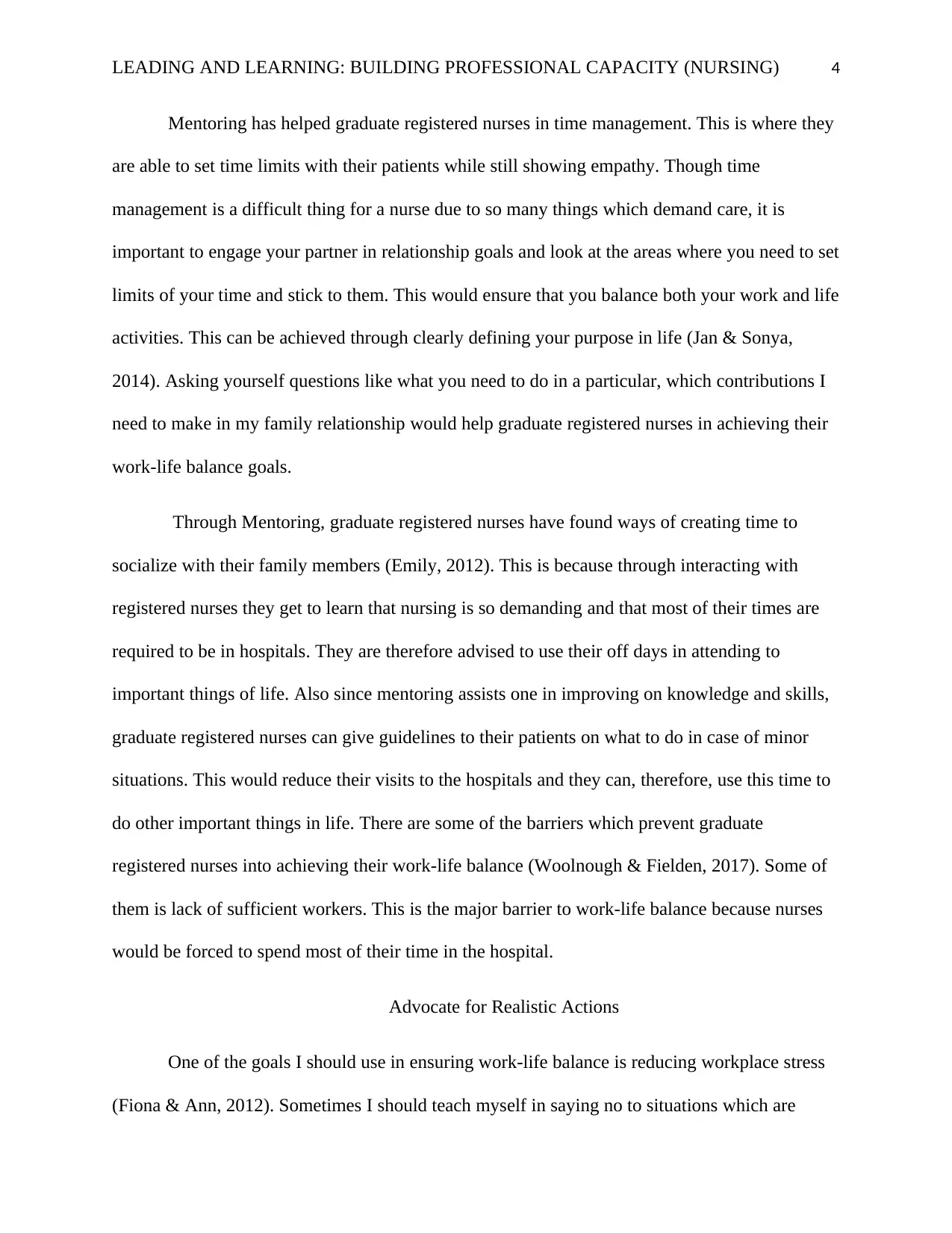
LEADING AND LEARNING: BUILDING PROFESSIONAL CAPACITY (NURSING) 4
Mentoring has helped graduate registered nurses in time management. This is where they
are able to set time limits with their patients while still showing empathy. Though time
management is a difficult thing for a nurse due to so many things which demand care, it is
important to engage your partner in relationship goals and look at the areas where you need to set
limits of your time and stick to them. This would ensure that you balance both your work and life
activities. This can be achieved through clearly defining your purpose in life (Jan & Sonya,
2014). Asking yourself questions like what you need to do in a particular, which contributions I
need to make in my family relationship would help graduate registered nurses in achieving their
work-life balance goals.
Through Mentoring, graduate registered nurses have found ways of creating time to
socialize with their family members (Emily, 2012). This is because through interacting with
registered nurses they get to learn that nursing is so demanding and that most of their times are
required to be in hospitals. They are therefore advised to use their off days in attending to
important things of life. Also since mentoring assists one in improving on knowledge and skills,
graduate registered nurses can give guidelines to their patients on what to do in case of minor
situations. This would reduce their visits to the hospitals and they can, therefore, use this time to
do other important things in life. There are some of the barriers which prevent graduate
registered nurses into achieving their work-life balance (Woolnough & Fielden, 2017). Some of
them is lack of sufficient workers. This is the major barrier to work-life balance because nurses
would be forced to spend most of their time in the hospital.
Advocate for Realistic Actions
One of the goals I should use in ensuring work-life balance is reducing workplace stress
(Fiona & Ann, 2012). Sometimes I should teach myself in saying no to situations which are
Mentoring has helped graduate registered nurses in time management. This is where they
are able to set time limits with their patients while still showing empathy. Though time
management is a difficult thing for a nurse due to so many things which demand care, it is
important to engage your partner in relationship goals and look at the areas where you need to set
limits of your time and stick to them. This would ensure that you balance both your work and life
activities. This can be achieved through clearly defining your purpose in life (Jan & Sonya,
2014). Asking yourself questions like what you need to do in a particular, which contributions I
need to make in my family relationship would help graduate registered nurses in achieving their
work-life balance goals.
Through Mentoring, graduate registered nurses have found ways of creating time to
socialize with their family members (Emily, 2012). This is because through interacting with
registered nurses they get to learn that nursing is so demanding and that most of their times are
required to be in hospitals. They are therefore advised to use their off days in attending to
important things of life. Also since mentoring assists one in improving on knowledge and skills,
graduate registered nurses can give guidelines to their patients on what to do in case of minor
situations. This would reduce their visits to the hospitals and they can, therefore, use this time to
do other important things in life. There are some of the barriers which prevent graduate
registered nurses into achieving their work-life balance (Woolnough & Fielden, 2017). Some of
them is lack of sufficient workers. This is the major barrier to work-life balance because nurses
would be forced to spend most of their time in the hospital.
Advocate for Realistic Actions
One of the goals I should use in ensuring work-life balance is reducing workplace stress
(Fiona & Ann, 2012). Sometimes I should teach myself in saying no to situations which are
Paraphrase This Document
Need a fresh take? Get an instant paraphrase of this document with our AI Paraphraser
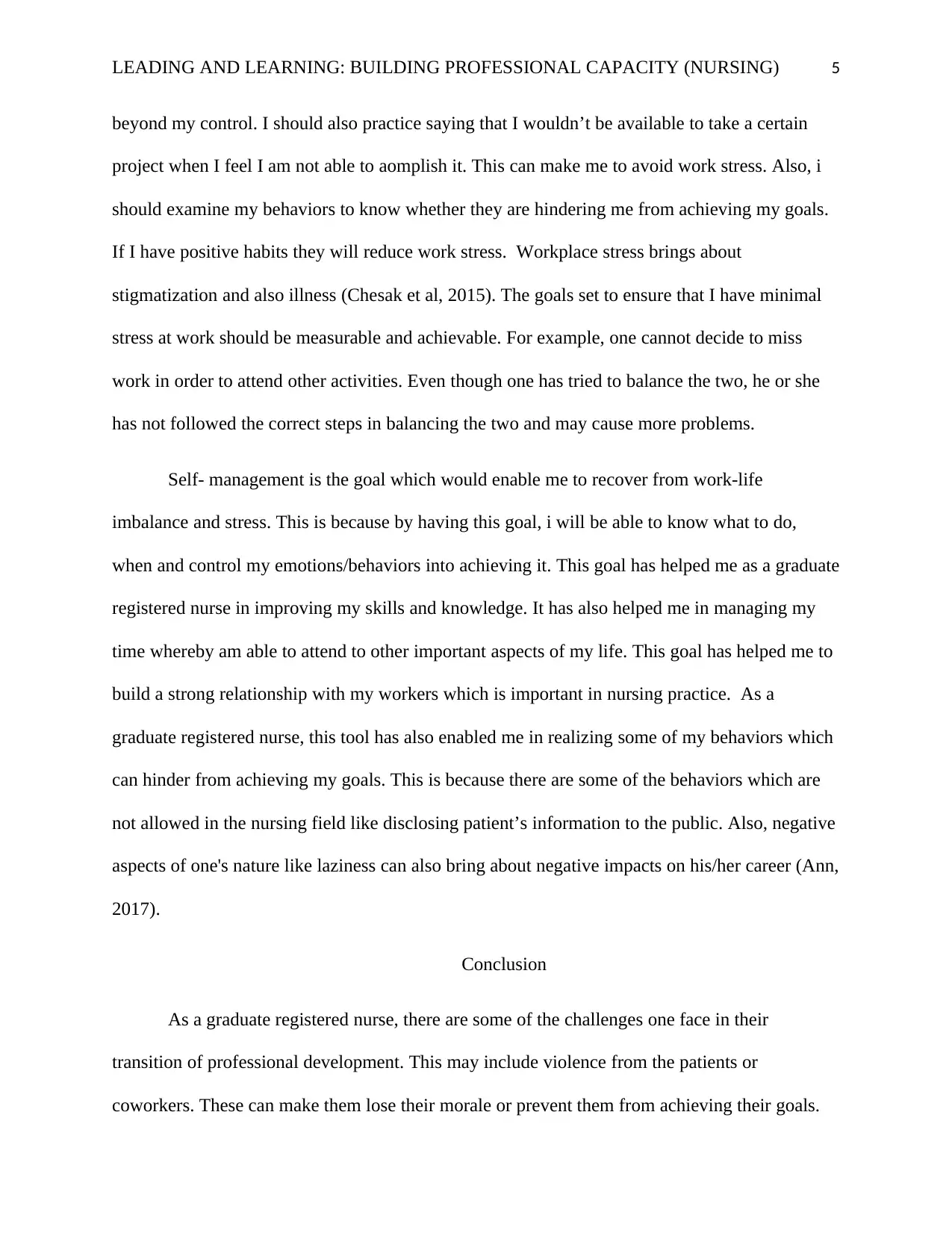
LEADING AND LEARNING: BUILDING PROFESSIONAL CAPACITY (NURSING) 5
beyond my control. I should also practice saying that I wouldn’t be available to take a certain
project when I feel I am not able to aomplish it. This can make me to avoid work stress. Also, i
should examine my behaviors to know whether they are hindering me from achieving my goals.
If I have positive habits they will reduce work stress. Workplace stress brings about
stigmatization and also illness (Chesak et al, 2015). The goals set to ensure that I have minimal
stress at work should be measurable and achievable. For example, one cannot decide to miss
work in order to attend other activities. Even though one has tried to balance the two, he or she
has not followed the correct steps in balancing the two and may cause more problems.
Self- management is the goal which would enable me to recover from work-life
imbalance and stress. This is because by having this goal, i will be able to know what to do,
when and control my emotions/behaviors into achieving it. This goal has helped me as a graduate
registered nurse in improving my skills and knowledge. It has also helped me in managing my
time whereby am able to attend to other important aspects of my life. This goal has helped me to
build a strong relationship with my workers which is important in nursing practice. As a
graduate registered nurse, this tool has also enabled me in realizing some of my behaviors which
can hinder from achieving my goals. This is because there are some of the behaviors which are
not allowed in the nursing field like disclosing patient’s information to the public. Also, negative
aspects of one's nature like laziness can also bring about negative impacts on his/her career (Ann,
2017).
Conclusion
As a graduate registered nurse, there are some of the challenges one face in their
transition of professional development. This may include violence from the patients or
coworkers. These can make them lose their morale or prevent them from achieving their goals.
beyond my control. I should also practice saying that I wouldn’t be available to take a certain
project when I feel I am not able to aomplish it. This can make me to avoid work stress. Also, i
should examine my behaviors to know whether they are hindering me from achieving my goals.
If I have positive habits they will reduce work stress. Workplace stress brings about
stigmatization and also illness (Chesak et al, 2015). The goals set to ensure that I have minimal
stress at work should be measurable and achievable. For example, one cannot decide to miss
work in order to attend other activities. Even though one has tried to balance the two, he or she
has not followed the correct steps in balancing the two and may cause more problems.
Self- management is the goal which would enable me to recover from work-life
imbalance and stress. This is because by having this goal, i will be able to know what to do,
when and control my emotions/behaviors into achieving it. This goal has helped me as a graduate
registered nurse in improving my skills and knowledge. It has also helped me in managing my
time whereby am able to attend to other important aspects of my life. This goal has helped me to
build a strong relationship with my workers which is important in nursing practice. As a
graduate registered nurse, this tool has also enabled me in realizing some of my behaviors which
can hinder from achieving my goals. This is because there are some of the behaviors which are
not allowed in the nursing field like disclosing patient’s information to the public. Also, negative
aspects of one's nature like laziness can also bring about negative impacts on his/her career (Ann,
2017).
Conclusion
As a graduate registered nurse, there are some of the challenges one face in their
transition of professional development. This may include violence from the patients or
coworkers. These can make them lose their morale or prevent them from achieving their goals.
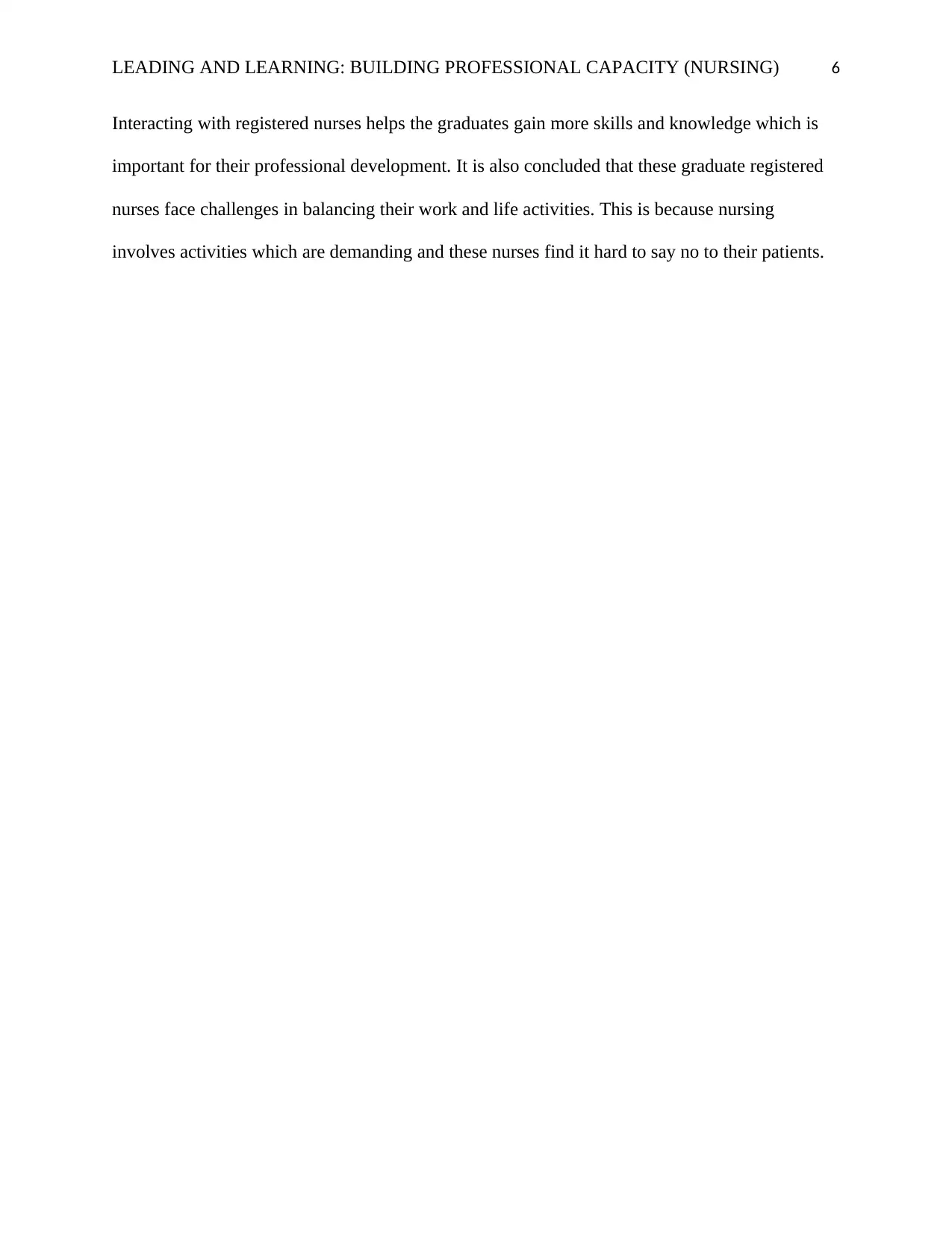
LEADING AND LEARNING: BUILDING PROFESSIONAL CAPACITY (NURSING) 6
Interacting with registered nurses helps the graduates gain more skills and knowledge which is
important for their professional development. It is also concluded that these graduate registered
nurses face challenges in balancing their work and life activities. This is because nursing
involves activities which are demanding and these nurses find it hard to say no to their patients.
Interacting with registered nurses helps the graduates gain more skills and knowledge which is
important for their professional development. It is also concluded that these graduate registered
nurses face challenges in balancing their work and life activities. This is because nursing
involves activities which are demanding and these nurses find it hard to say no to their patients.
⊘ This is a preview!⊘
Do you want full access?
Subscribe today to unlock all pages.

Trusted by 1+ million students worldwide
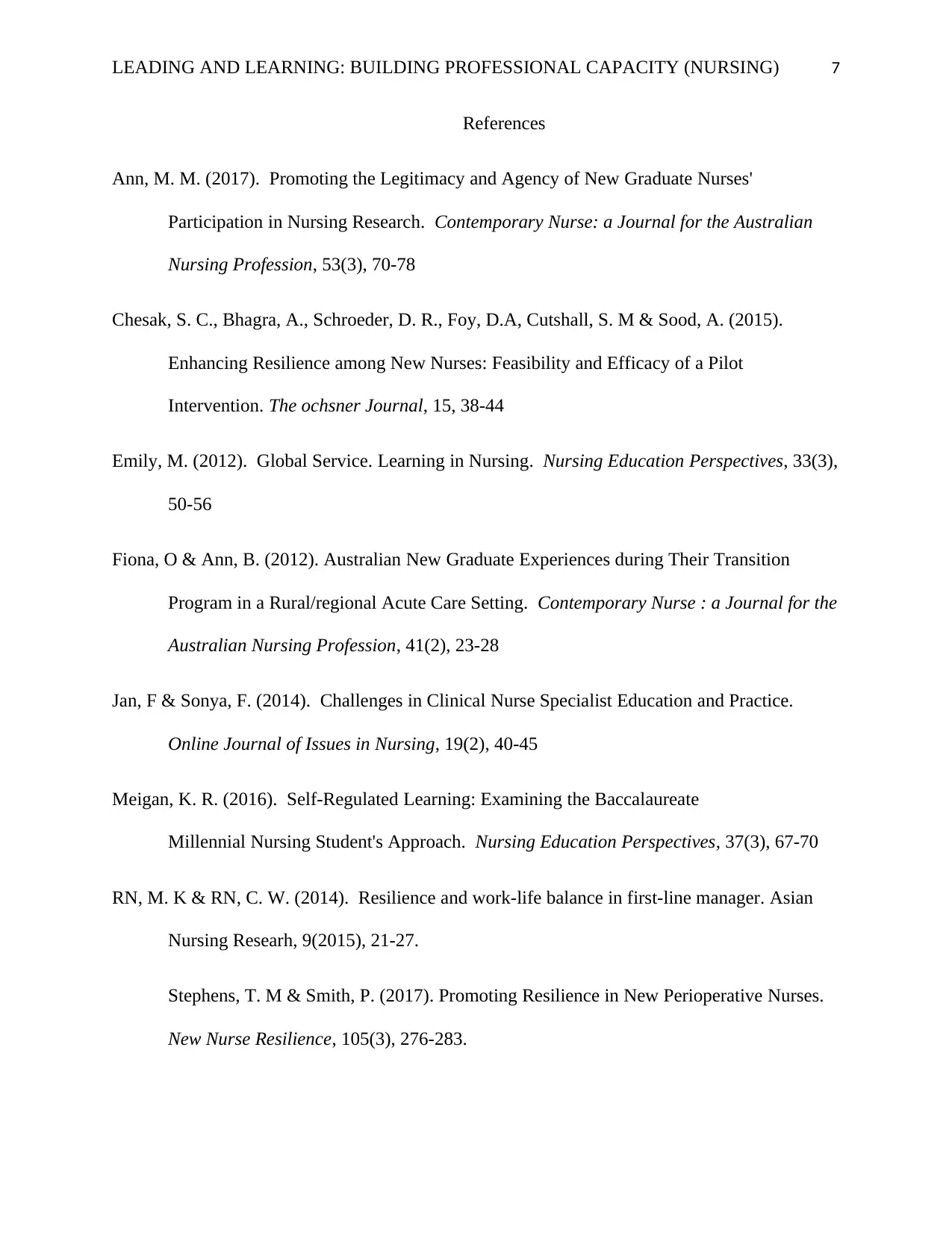
LEADING AND LEARNING: BUILDING PROFESSIONAL CAPACITY (NURSING) 7
References
Ann, M. M. (2017). Promoting the Legitimacy and Agency of New Graduate Nurses'
Participation in Nursing Research. Contemporary Nurse: a Journal for the Australian
Nursing Profession, 53(3), 70-78
Chesak, S. C., Bhagra, A., Schroeder, D. R., Foy, D.A, Cutshall, S. M & Sood, A. (2015).
Enhancing Resilience among New Nurses: Feasibility and Efficacy of a Pilot
Intervention. The ochsner Journal, 15, 38-44
Emily, M. (2012). Global Service. Learning in Nursing. Nursing Education Perspectives, 33(3),
50-56
Fiona, O & Ann, B. (2012). Australian New Graduate Experiences during Their Transition
Program in a Rural/regional Acute Care Setting. Contemporary Nurse : a Journal for the
Australian Nursing Profession, 41(2), 23-28
Jan, F & Sonya, F. (2014). Challenges in Clinical Nurse Specialist Education and Practice.
Online Journal of Issues in Nursing, 19(2), 40-45
Meigan, K. R. (2016). Self-Regulated Learning: Examining the Baccalaureate
Millennial Nursing Student's Approach. Nursing Education Perspectives, 37(3), 67-70
RN, M. K & RN, C. W. (2014). Resilience and work-life balance in first-line manager. Asian
Nursing Researh, 9(2015), 21-27.
Stephens, T. M & Smith, P. (2017). Promoting Resilience in New Perioperative Nurses.
New Nurse Resilience, 105(3), 276-283.
References
Ann, M. M. (2017). Promoting the Legitimacy and Agency of New Graduate Nurses'
Participation in Nursing Research. Contemporary Nurse: a Journal for the Australian
Nursing Profession, 53(3), 70-78
Chesak, S. C., Bhagra, A., Schroeder, D. R., Foy, D.A, Cutshall, S. M & Sood, A. (2015).
Enhancing Resilience among New Nurses: Feasibility and Efficacy of a Pilot
Intervention. The ochsner Journal, 15, 38-44
Emily, M. (2012). Global Service. Learning in Nursing. Nursing Education Perspectives, 33(3),
50-56
Fiona, O & Ann, B. (2012). Australian New Graduate Experiences during Their Transition
Program in a Rural/regional Acute Care Setting. Contemporary Nurse : a Journal for the
Australian Nursing Profession, 41(2), 23-28
Jan, F & Sonya, F. (2014). Challenges in Clinical Nurse Specialist Education and Practice.
Online Journal of Issues in Nursing, 19(2), 40-45
Meigan, K. R. (2016). Self-Regulated Learning: Examining the Baccalaureate
Millennial Nursing Student's Approach. Nursing Education Perspectives, 37(3), 67-70
RN, M. K & RN, C. W. (2014). Resilience and work-life balance in first-line manager. Asian
Nursing Researh, 9(2015), 21-27.
Stephens, T. M & Smith, P. (2017). Promoting Resilience in New Perioperative Nurses.
New Nurse Resilience, 105(3), 276-283.
Paraphrase This Document
Need a fresh take? Get an instant paraphrase of this document with our AI Paraphraser
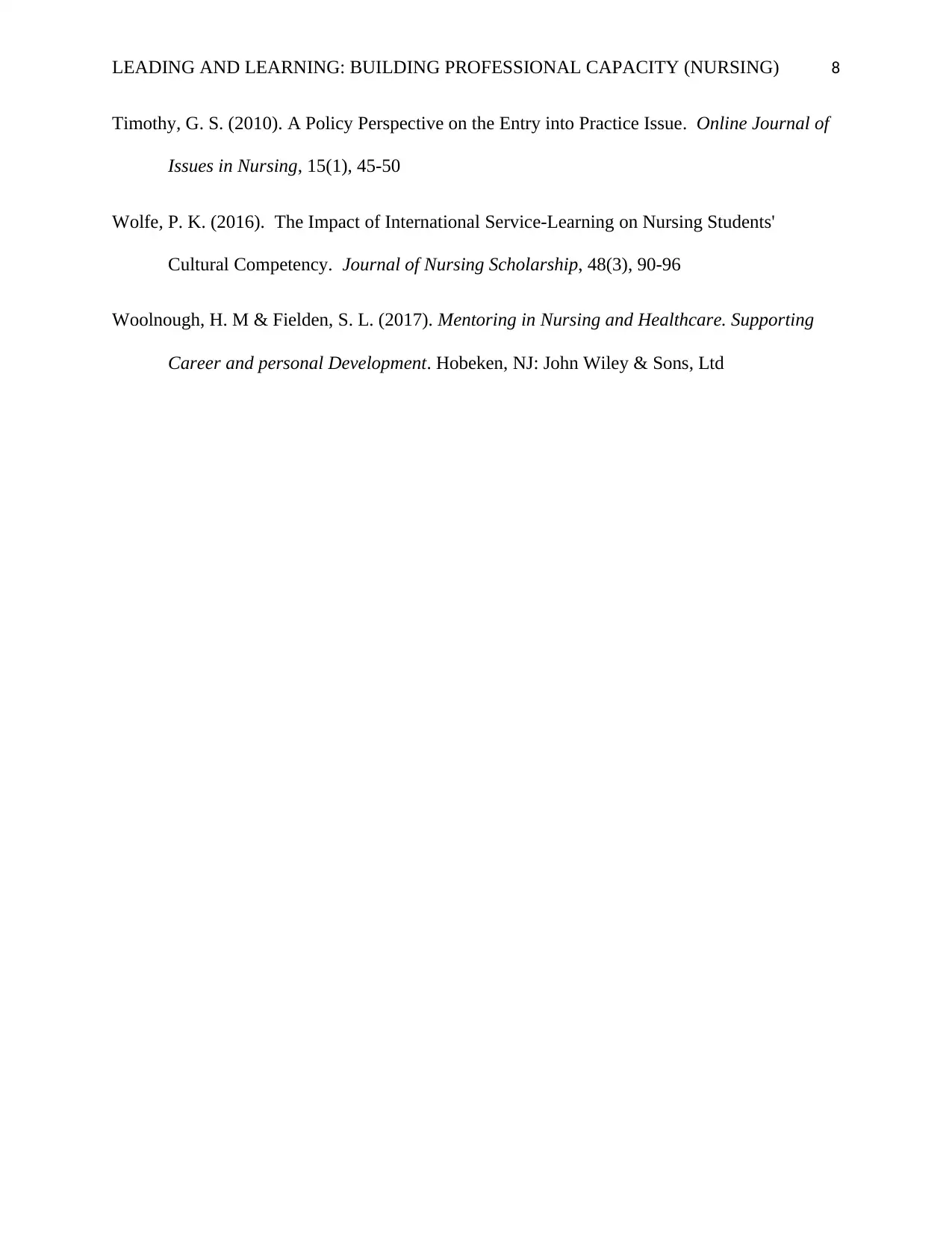
LEADING AND LEARNING: BUILDING PROFESSIONAL CAPACITY (NURSING) 8
Timothy, G. S. (2010). A Policy Perspective on the Entry into Practice Issue. Online Journal of
Issues in Nursing, 15(1), 45-50
Wolfe, P. K. (2016). The Impact of International Service-Learning on Nursing Students'
Cultural Competency. Journal of Nursing Scholarship, 48(3), 90-96
Woolnough, H. M & Fielden, S. L. (2017). Mentoring in Nursing and Healthcare. Supporting
Career and personal Development. Hobeken, NJ: John Wiley & Sons, Ltd
Timothy, G. S. (2010). A Policy Perspective on the Entry into Practice Issue. Online Journal of
Issues in Nursing, 15(1), 45-50
Wolfe, P. K. (2016). The Impact of International Service-Learning on Nursing Students'
Cultural Competency. Journal of Nursing Scholarship, 48(3), 90-96
Woolnough, H. M & Fielden, S. L. (2017). Mentoring in Nursing and Healthcare. Supporting
Career and personal Development. Hobeken, NJ: John Wiley & Sons, Ltd
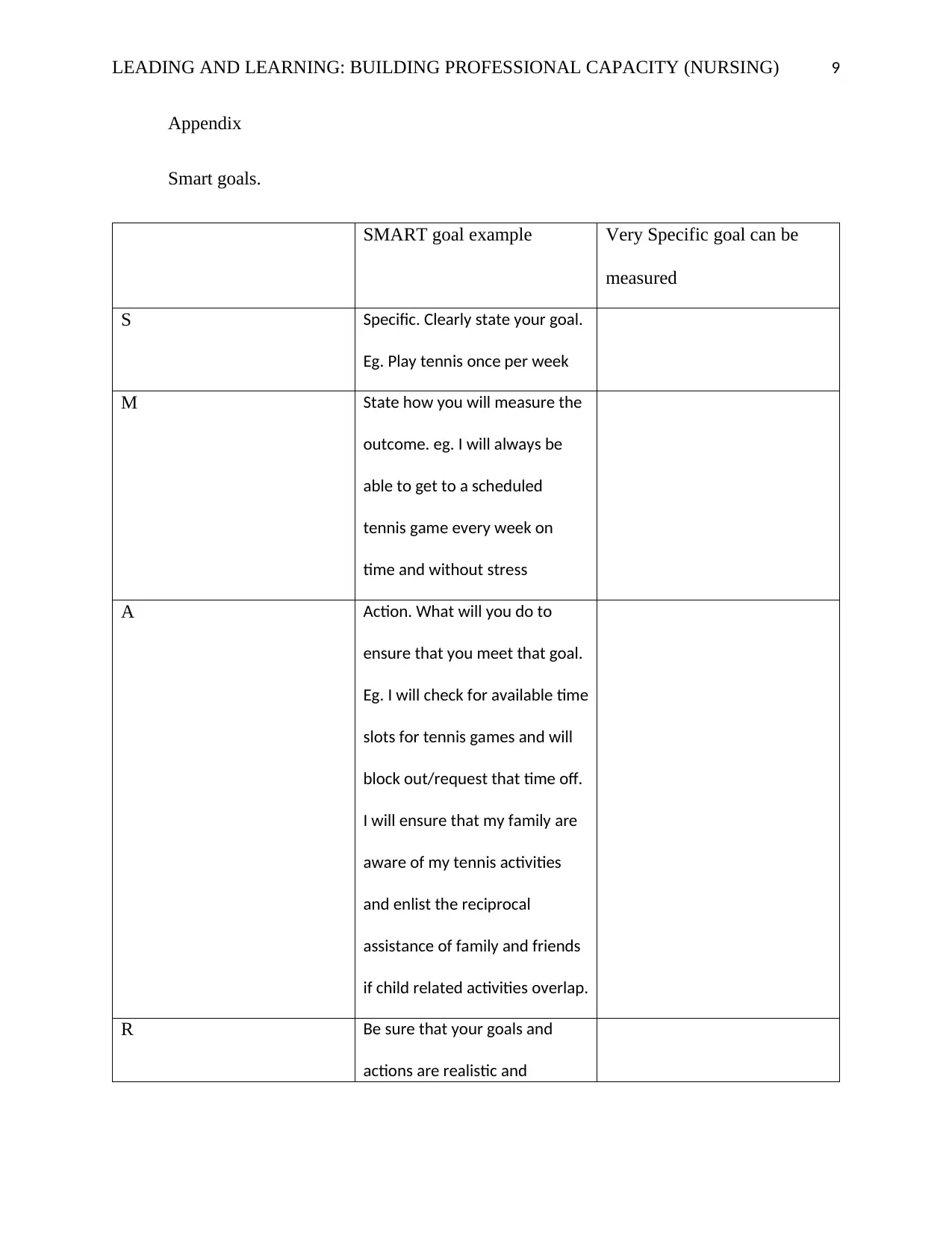
LEADING AND LEARNING: BUILDING PROFESSIONAL CAPACITY (NURSING) 9
Appendix
Smart goals.
SMART goal example Very Specific goal can be
measured
S Specific. Clearly state your goal.
Eg. Play tennis once per week
M State how you will measure the
outcome. eg. I will always be
able to get to a scheduled
tennis game every week on
time and without stress
A Action. What will you do to
ensure that you meet that goal.
Eg. I will check for available time
slots for tennis games and will
block out/request that time off.
I will ensure that my family are
aware of my tennis activities
and enlist the reciprocal
assistance of family and friends
if child related activities overlap.
R Be sure that your goals and
actions are realistic and
Appendix
Smart goals.
SMART goal example Very Specific goal can be
measured
S Specific. Clearly state your goal.
Eg. Play tennis once per week
M State how you will measure the
outcome. eg. I will always be
able to get to a scheduled
tennis game every week on
time and without stress
A Action. What will you do to
ensure that you meet that goal.
Eg. I will check for available time
slots for tennis games and will
block out/request that time off.
I will ensure that my family are
aware of my tennis activities
and enlist the reciprocal
assistance of family and friends
if child related activities overlap.
R Be sure that your goals and
actions are realistic and
⊘ This is a preview!⊘
Do you want full access?
Subscribe today to unlock all pages.

Trusted by 1+ million students worldwide
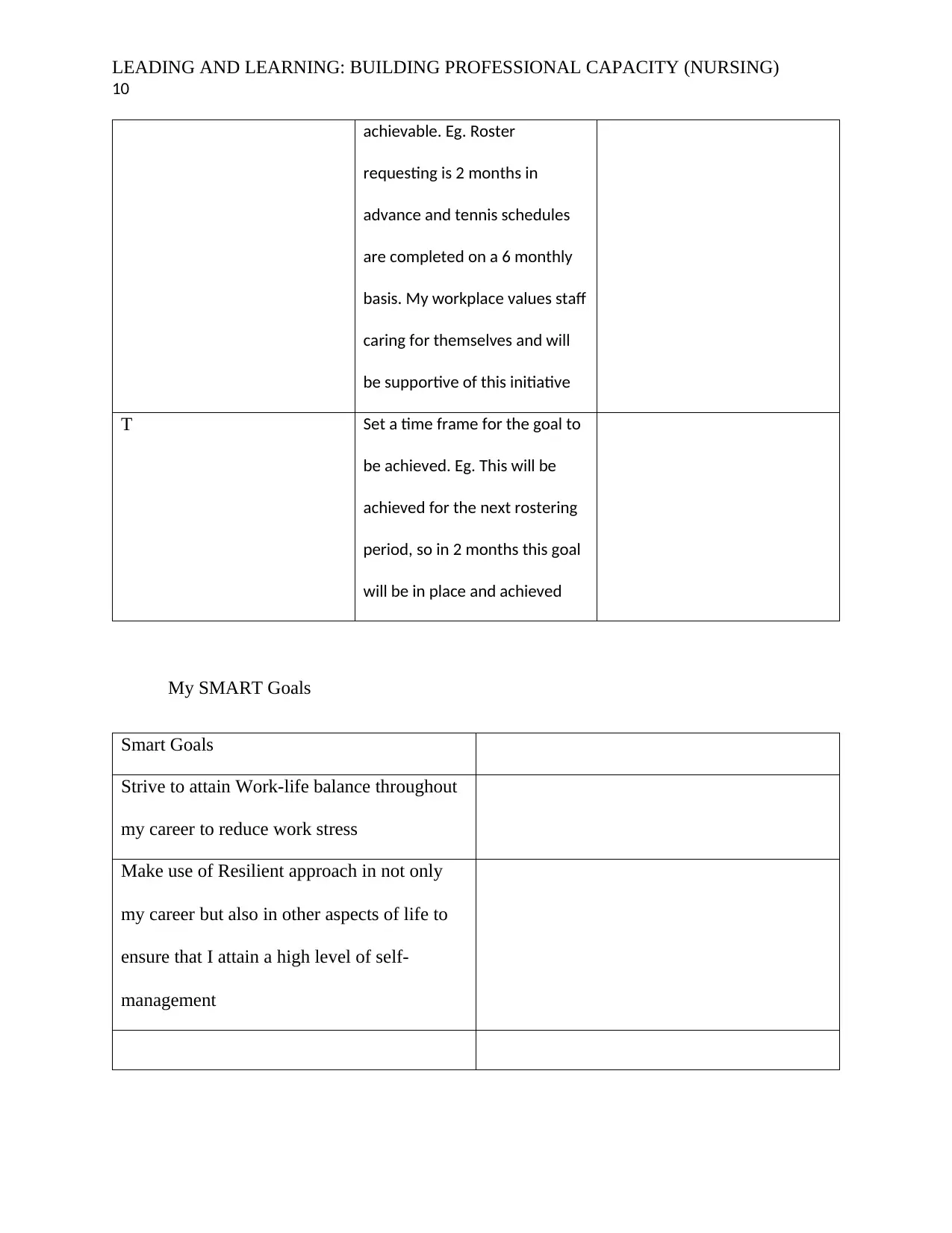
LEADING AND LEARNING: BUILDING PROFESSIONAL CAPACITY (NURSING)
10
achievable. Eg. Roster
requesting is 2 months in
advance and tennis schedules
are completed on a 6 monthly
basis. My workplace values staff
caring for themselves and will
be supportive of this initiative
T Set a time frame for the goal to
be achieved. Eg. This will be
achieved for the next rostering
period, so in 2 months this goal
will be in place and achieved
My SMART Goals
Smart Goals
Strive to attain Work-life balance throughout
my career to reduce work stress
Make use of Resilient approach in not only
my career but also in other aspects of life to
ensure that I attain a high level of self-
management
10
achievable. Eg. Roster
requesting is 2 months in
advance and tennis schedules
are completed on a 6 monthly
basis. My workplace values staff
caring for themselves and will
be supportive of this initiative
T Set a time frame for the goal to
be achieved. Eg. This will be
achieved for the next rostering
period, so in 2 months this goal
will be in place and achieved
My SMART Goals
Smart Goals
Strive to attain Work-life balance throughout
my career to reduce work stress
Make use of Resilient approach in not only
my career but also in other aspects of life to
ensure that I attain a high level of self-
management
1 out of 10
Related Documents
Your All-in-One AI-Powered Toolkit for Academic Success.
+13062052269
info@desklib.com
Available 24*7 on WhatsApp / Email
![[object Object]](/_next/static/media/star-bottom.7253800d.svg)
Unlock your academic potential
Copyright © 2020–2026 A2Z Services. All Rights Reserved. Developed and managed by ZUCOL.





